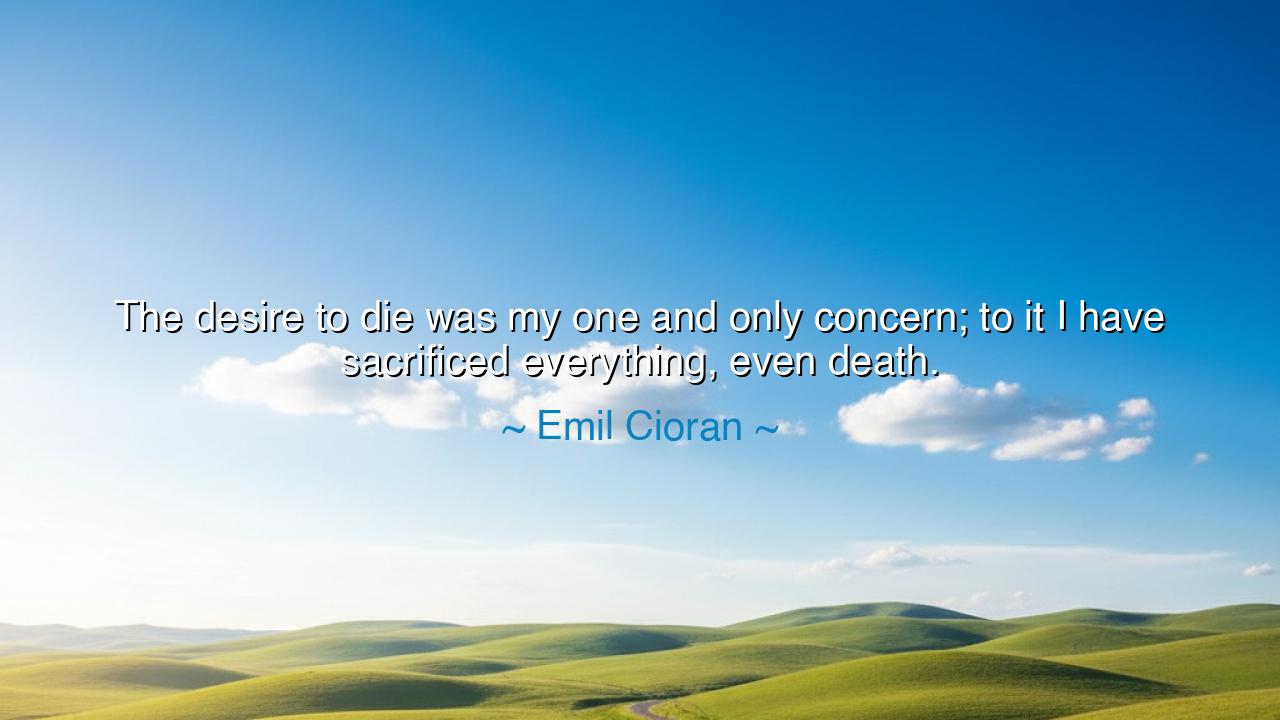
The desire to die was my one and only concern; to it I have
The desire to die was my one and only concern; to it I have sacrificed everything, even death.






“The desire to die was my one and only concern; to it I have sacrificed everything, even death.” Thus wrote Emil Cioran, the philosopher of darkness, the poet of despair whose words burn with the cold fire of existence itself. In this terrible and magnificent confession, Cioran bares the soul of one who has wrestled with the abyss and refused to look away. His words are not the cry of defeat, but the fierce acknowledgment of what it means to be conscious—to feel too deeply, to think too endlessly, to live so intensely that even death becomes a dream that cannot be fulfilled.
The origin of this thought lies in Cioran’s lifelong confrontation with nihilism and the futility of existence. Born in Romania in 1911 and later exiled in France, he lived through the horrors of war and the spiritual emptiness of modernity. He saw that the human spirit, when stripped of faith, still hungers for meaning—and in its starvation, often turns upon itself. The “desire to die,” for Cioran, is not merely the wish for an end, but the recognition that life and death are bound in an eternal struggle within the human soul. To desire death is to desire escape from suffering, but to live with that desire and not act upon it is to taste the bitterness of both life and death, without finding peace in either.
Yet within this despair lies a paradox of profound insight. When Cioran says he “sacrificed everything, even death,” he means that his longing for death became so consuming that he could no longer even achieve it. He had burned so deeply in his contemplation of mortality that the act of dying itself lost its meaning. What remained was pure existence—a raw, unadorned consciousness, stripped of illusion, yet still burning. In a cruel and divine irony, his devotion to the idea of death led him to the fullest, most relentless confrontation with life itself.
There is an echo here of the ancient Stoics, who taught that freedom comes not from fleeing pain, but from facing it without surrender. Seneca, the Roman philosopher, once said, “He who fears death will never do anything worthy of a living man.” Yet Cioran turns this truth upon its head: he does not fear death—he fears that death will not deliver him. Like Prometheus chained to the rock, he is condemned to consciousness, eternally aware, eternally thinking. His torment is not that he must die, but that he must live despite wishing otherwise.
History offers many who have stood upon this same precipice and found revelation in the void. Fyodor Dostoevsky, when facing execution before his reprieve, wrote that in the instant before death, he saw all of life transfigured. “What if I were not to die!” he thought. “What an eternity of happiness lies in every moment!” Thus, the confrontation with annihilation became, paradoxically, an awakening. Cioran too found this awakening—but without consolation. He teaches us, through agony, that to endure despair without escape is itself a kind of heroism, a form of tragic self-mastery.
What, then, shall the living learn from such a dark gospel? It is not to seek despair, nor to glorify pain, but to understand that to live consciously is to suffer, and that within this suffering lies a strange purity. When one ceases to flee from the thought of death, life begins to reveal its fragile brilliance—the trembling of leaves, the warmth of the sun, the fleeting smile of a stranger. Those who have peered into the abyss and returned often find that the smallest moments gleam with unbearable beauty. Cioran’s words are a descent, yes, but also a mirror—showing us that only by losing everything, even our illusions about death, can we begin to see what remains real.
The lesson, then, is this: do not fear the darkness of the soul, for even in despair there is truth. If the desire to die haunts you, do not surrender to it, but ask what part of you longs to be reborn. Every wish for an ending hides a yearning for transformation. As Cioran himself discovered, death is not always the answer, but the question that burns at the edge of life’s mystery. To endure that question, to live without fleeing from it—that is courage.
So, O seeker, remember this: life will wound you, and at times, you will long for its end. But if you can stand, as Cioran did, between the shadow and the light, and refuse to flee either, you will find a wisdom few have known. For to sacrifice even death is to rise beyond despair—to become not merely alive, but awake in the truest, most terrifying, and most sacred sense of the word.






AAdministratorAdministrator
Welcome, honored guests. Please leave a comment, we will respond soon